9+ SAMPLE Copyright Music Licence Contract
-
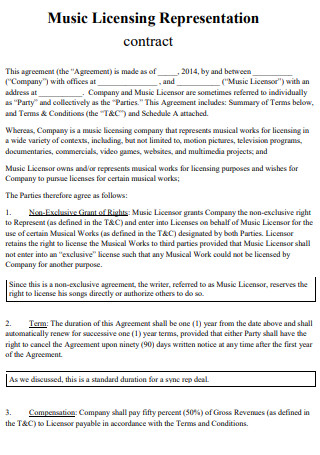
Music License Representation Contract
download now -
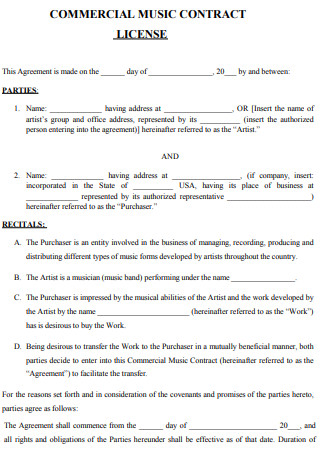
Commercial Music License Contract
download now -
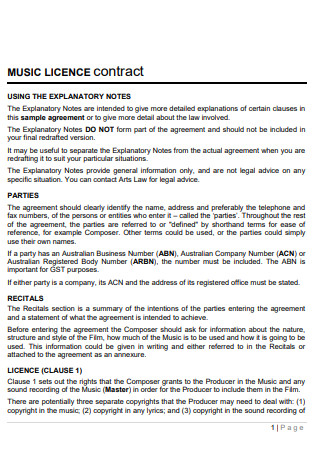
Film Music License Contract
download now -
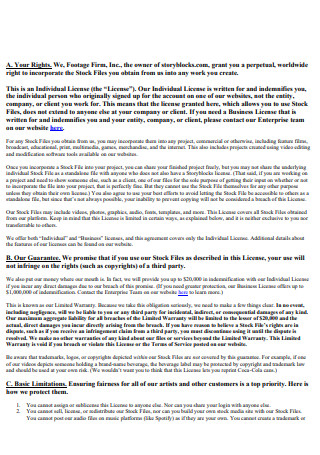
Individual Music License Contract
download now -
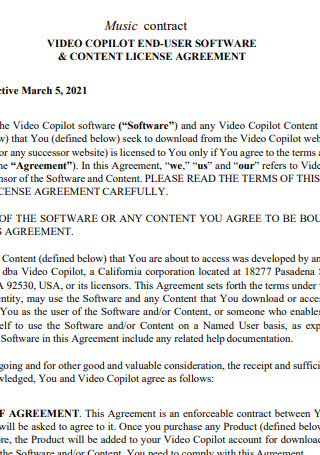
Music Software License Contract
download now -
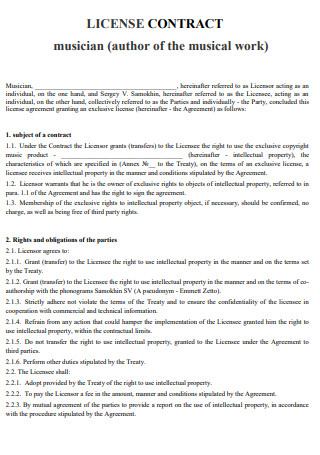
Music Work License Contract
download now -
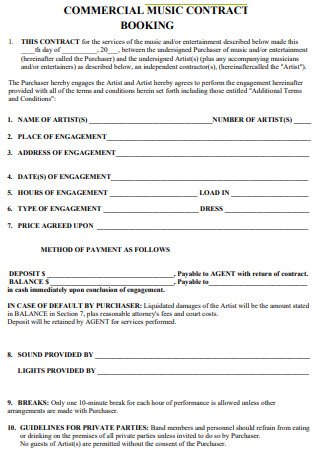
Music License Booking Contract
download now -
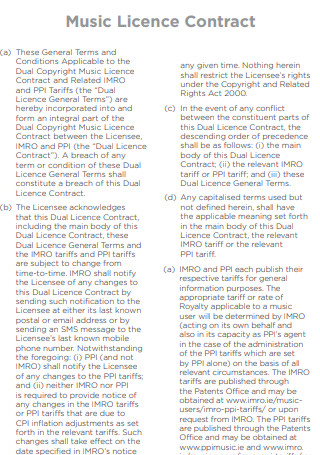
Sample Music License Contract
download now -
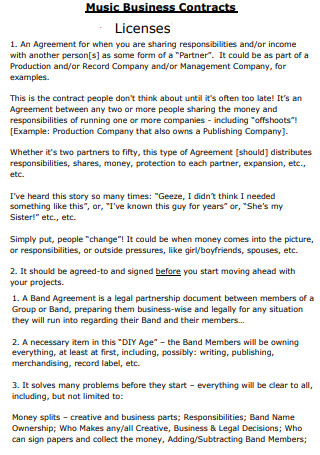
Music Business License Contract
download now -
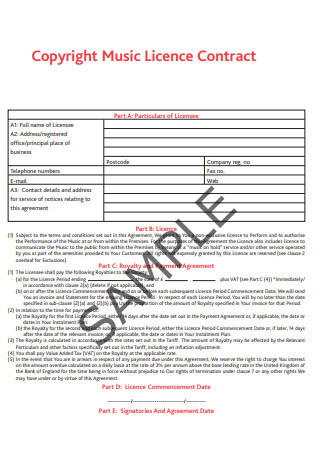
Copyright Music Licence Contract
download now
FREE Copyright Music Licence Contract s to Download
9+ SAMPLE Copyright Music Licence Contract
What is a Copyright Music Licence Contract?
Elements in a Copyright Music Licence Contract
Types of Music Licenses
Tips on Copyright Music License Contract
How to Create a Copyright Music License Contract
FAQs
What are the Basics of a Copyright Music License Contract?
What are the Benefits of Registering the Copyright?
What is a Copyright Music Licence Contract?
A copyright music license contract is a document that contains the agreement of the licensee and the licensor about copyright of a song or music. The licensee is the company who is going to buy the music and will have the right to sell the music. The licensor is the musician who created the music and the one who is going to sell the rights to the licensor. A copyright music license contract is the giving of rights to the licensee to legally operate on using the music in any possible endeavors. They can use it in films and videos. They can sell and distribute it to the public. The act of buying is a respect to the intellectual property of the musician. The musician will be paid an agreed-upon royalty that can prove that he or she is the rightful owner of the music. The talent of a music artist is greatly needed by any producer who needs music in their films and videos. Music enhances any film. It makes it more alive for the audience. The artist’s musical talent is needed in many media as a result. Without music, their projects can be dull so the by-products of musicians are a must to be bought. And to be able to use the musicians’ music, producers must pay them a certain amount for the copyright and some royalties to continually respect their rights. After paying musicians, producers can have the record label for the music. They are free to use the music in many things, according to whatever they have agreed upon in the music license agreement. Whether it is a non-exclusive beat license or an exclusive licensing agreement, any form in licensing gives the rightful use to the licensee to reproduce the music and use it in public, also following the agreement. It is a simple but meaningful contract, to sell music to a party that will use it in their business.
Elements in a Copyright Music Licence Contract
There are copyright guidelines and resources. A copyright music license contract has elements that make it complete. There is a copyrighted format for music that can be followed. Read the following and learn some of the elements of a copyright music license contract:
Payment and Royalty
This is the price that the licensee has to pay the licensor. They should agree for a particular price to be paid to the licensor. They should also negotiate about the royalty or the continuous payment that a licensor can get from the licensee. In coming into an agreed price, they should both consider inflation and the exchange rates to come up with the right price for the music.
Exclusive Rights
The licensee can sell the music, but some restrictions have to be set. The licensor can limit the selling of the music in a particular territory. They should agree about that limitation or exclusivity. If the licensor can only sell the music in a particular country, the licensee should be definite in the contract. The licensee should state the places where he or she can give the right to the licensor.
Subsidiary Licensing
If another entity will use the song, the licensor should ask the permission of the licensee. This is called subsidiary licensing. There may be a time that another person should use the song. It will not be possible unless the licensee permits that person to use the music.
Quality Check
Quality assurance should be given in using the licensed music. The music must be utilized in the right way. The licensee must ensure this thing. Quality checks should be done and the licensor must keep track of all the sales.
Other Agreements
There can be other agreements that can be added to the contract. Sometimes, parties may want a non-disclosure agreement to maintain confidentiality with their dealing. Other agreements may be used so that both parties can make the most out of their agreement.
Types of Music Licenses
Whether you are going to engage in a music video license agreement or just considering a recording contract template, you may want to know the type of music licenses so that you will know how to deal with the party with whom you will have the agreement. Consider the following and know the types of music licenses:
Tips on Copyright Music License Contract
Do you need a music licensing contract template or a simple music license agreement template? Are you needing it because you want to have some tips that you can use in creating a contract? You do not have to look further. We have provided some tips for you that you can use. They are the following:
How to Create a Copyright Music License Contract
Do you want to have a copyright of music? Are you out of ways on how you can do it? We have some steps that you can follow for you to have a copyright. Read the following:
-
Step 1: Determine the Status of the Song
If you want to have a copyright of certain music, you should research it. Know if it has already been copyrighted. If a song is popular, maybe it has already had copyright. So, you should research how you can have your copyright. Know the details of the licensee so that you will know how to contact him or her. After contacting the licensee, start negotiating.
-
Step 2: Have an Agreement with the Artist
You should negotiate with the artist. Know the terms that the artist wants for the copyright. Start a good relationship with the artist. You will be together working for a long time because of royalties. Be courteous with the artist so that you can make him or her grant you the copyright. Show your sincere interest to make his or her music famous.
-
Step 3: Negotiate the Price
Offer a good price for the copyright that you will have from the licensee. Another thing is the royalty. Offer a good amount or percentage of royalty, so that you can get the approval of selling the music. If the price is right, there will be no reason for the licensee not to give you the rights. If you cannot make the licensee agree with your offered price, know his or her price, and consider that amount. Remember that you can profit from his or her music, so you can consider the price that the licensee will request. The licensee is the owner of the music after all.
-
Step 4: Sign the Contract
After the two of you have agreed to all the terms, you can start drafting the contract. Hire a lawyer to get a consultation about the contract. If the lawyer approves the contract, then get the contract written. Then when it is made, you and the licensee should sign the contract. After that, you will have the right to sell the artist’s music.
FAQs
What are the Basics of a Copyright Music License Contract?
The work to be copyrighted should be original. There should be no violation of the contract because it can be brought into a court of law. If the artist will die, the copyright will last for 70 years.
What are the Benefits of Registering the Copyright?
You can have a record of your copyright through registering. You can go to court if infringement will happen in the copyright.
The licensor can get a lot of profit from having copyright certain music. He or she just has to convince the licensee to give the permission. And of course, to make the licensee sign in a copyright music license contract. And the licensor can reproduce and use the music in a lot of ways. Do you need a template for a copyright music license contract? This post has 9+ SAMPLE Copyright Music Licence Contract in PDF. They are free and downloadable. Download now!
